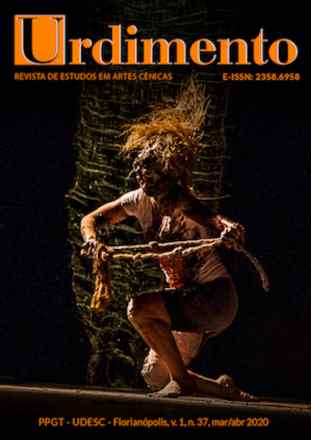Em torno das traduções pirandellianas de Seis personagens em Portugal e no Brasil
Urdimento
Em torno das traduções pirandellianas de Seis personagens em Portugal e no Brasil
Autor Correspondente: Sebastiana Fadda | [email protected]
Palavras-chave: Estudos de Teatro; Estudos de Tradução; História do Teatro
Resumos Cadastrados
Resumo Português:
O artigo debruça-se sobre as traduções portuguesas e brasileiras de Sei personaggi in cerca d’autore, uma das peças mais discutidas quando da sua estreia, ocorrida no Teatro Alfieri de Turim em 1921, e que mudaria a história do teatro ocidental do século XX. Estudiosos, crítica e público assistiram à quebra das convenções dramáticas (inclusive mimese e palco da ilusão), ao esbatimento da autoridade (do “autor”, “diretor”, “ator”, “agente” e “agido”), à presença difusa do relativismo e da fragmentação do eu (do “ser”, “pessoa”, “persona” e “personagem”). A projeção internacional, com traduções e representações noutras línguas e países, foi imediata. No entanto, as versões em português depararam-se com as contingências e problemas de censura, tendo de esperar cerca de trinta anos (no Brasil) e quase quarenta (em Portugal) antes de serem levadas à cena. Este estudo de caso reflete sobre algumas consequências, opções e estratégias tradutórias que emergem da análise dos textos traduzidos.
Resumo Inglês:
The article focuses the Portuguese and Brazilian translations of Sei personaggi in cerca d’autor, one of the most discussed pieces at the time of its première, which took place at the Teatro Alfieri in Turin in 1921, and which would change the history of the Western theatre of the 20th century. Scholars, critics and publics have witnessed the breakdown of dramatic conventions (including mimesis and stage of illusion), the fading of authority (from “author”, “director”, “actor”, “agent” and “acted”), the diffused presence of relativism and fragmentation of the self (of “being”, “person”, “persona” and “character”). The international projection, with the translations and representations in other languages and countries, was immediate. However, the Portuguese versions were faced with contingencies and problems of censorship, having to wait about thirty years (inBrazil) and almost forty (in Portugal) before being taken to the scene. This case study reflects on some consequences,options and translation strategies that emerge from the analysis of translated texts.

